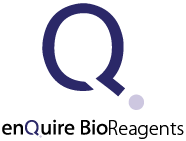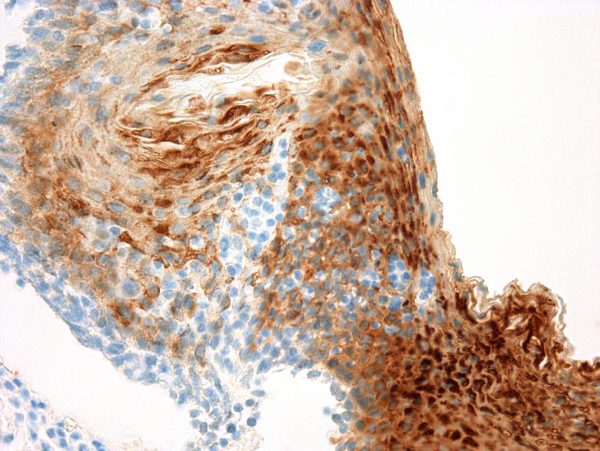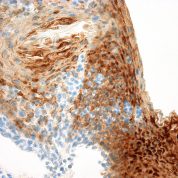Antibody (Suitable for clinical applications)
Sample Type: FFPE Patient Samples.
Tested Applications: IHC. Approved for In Vitro Diagnostic Procedures on FFPE tissues. For tissue collection recommendations, please see datasheet sent with product.
Application Notes
| Specification | Recommendation |
|---|---|
| Recommended Dilution (Conc) | 1:25-1:100 |
| Pretreatment | Citrate Buffer pH 6.0 |
| Incubation Parameters | 30 min at Room Temperature |
Prior to use, inspect vial for the presence of any precipitate or other unusual physical properties. These can indicate that the antibody has degraded and is no longer suitable for patient samples. Please run positive and negative controls simultaneously with all patient samples to account and control for errors in laboratory procedure. Use of methods or materials not recommended by enQuire Bio including change to dilution range and detection system should be routinely validated by the user.
Clonality: Monoclonal
Anti-Cytokeratin 13 Antibody Clone: KS-1A3
Host and Isotype: Mouse IgG1
Recommended Positive Control Sample: Skin
Cellular Localization of Antibody KS-1A3 Staining: Cytoplasmic
Buffer and Stabilizer: PBS with 1% BSA and 0.05% NaN3
Antibody Concentration: Lot specific. Plese contact tech support for data.
Immunogen: Cultured A431 cells from a human epidermoid carcinoma of the vulva.
Storage Conditions: This antibody should be stored refrigerated (2-8°C). This product should not be used past the expiration date printed on the vial.
Cytokeratin 13 Information for Pathologists
Summary:
Molecular weight is 53 kDa. Pairs with CK4. Marker of mature but non-keratinized squamous epithelium. Downregulated in squamous cell carcinoma of head and neck (Oral Oncol 2005;41:183) and other sites (Virchows Arch A Pathol Anat Histopathol 1991;418:249). Sensitive marker for retinoid bioactivity in skin warts of renal transplant recipients (Arch Dermatol 2002;138:61).Common Uses By Pathologists:
No significant clinical use by pathologists. Positive staining - normal Suprabasal layers of non-cornified stratified epithelium, including squamous (non-keratinized) epithelia of cervix, esophagus, larynx, oral cavity, tonsils, urothelium, and respiratory-type epithelium. May be filled with mucoid material or foamy macrophages. Positive staining - diseaseLimitations and Warranty
This antibody is manufactured in accordance with clinical good manufacturing practices in an ISO13485:2016 certified production facility. It is intended for multiple uses including in vitro diagnostic use and research use only applications. Please see vial label for expiration date. We strive to always deliver antibodies with a shelf life of at least two years.






There are no reviews yet.